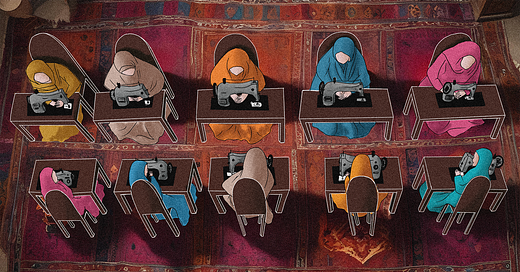A Sewing Sanctuary
As women around her were forced from their jobs, Zainab* offered them a source of income and a safe place to work
The atmosphere in the Kabul sewing room is sunny, a spirit of camaraderie uniting the women in their work. Amid the click and hum of sewing machines, they swap notes, offering tips on trickier garments and discussing the price of food or family life at home. From time to time, Zainab, the founder of Arya Sewing Company, wanders between the tables, stopping to ask about their well-being. It’s important to her that they feel safe and happy here. Life outside these walls has changed dramatically since the Taliban seized power three years ago, particularly for women.
Many of the seamstresses here worked in the previous government or were at university before the Taliban seized power. Their lives changed radically when women and girls were barred from their studies and sent home from work. Others were housewives whose husbands lost their jobs; now they want to help their families survive the economic crisis that has gripped the country since. “The situation is getting worse with many of the men unemployed, so now is the time for Afghan women to work harder, but they need support to do so,” says Zainab, 55.
In the months following the Taliban takeover, she watched the impact on women around her as their world shrank with each new restriction. Soon, they were unable to study, work, or travel. Some hardly left the house. “I know many of the women in my area were depressed because they had lost their opportunities and livelihoods, so I had the idea to train them while also offering support with mental health.”
In 2006, she launched an all-female sewing company to provide training and employment in her community. The business made a modest profit, and she was able to support her own family with the proceeds. Since then, she has trained almost 80 seamstresses, 25 of whom now work for her, producing everyday clothing, special occasion wear, and traditional Afghan garments. The price of these traditional clothes can range from US $100 to $500, depending on the level of detail required. Everyday items are cheaper, though being handmade, they cost more than clothing bought off the rails.
As a result, their clients tend to be wealthier women, who will often bring pictures from social media to be replicated. “Previously, people would buy expensive clothes more often, especially for weddings and other events, but now they are more economical,” Zainab says. Though times are hard, she feels lucky to be supporting her family while providing opportunities to other women in her community. “The situation in Afghanistan is not ideal, but we are still hopeful it will improve, and we’re grateful to be making a living,” she says.
As the business grows, Zainab dreams of becoming a well-known brand and tapping into overseas markets, providing traditional hand-made garments to Afghan communities around the world. To do that, she needs more equipment. After beginning with just two sewing machines in a room at her house, she has expanded and recently secured a dedicated space for the women to work together thanks to an Innovation Hub grant from Ideas Beyond Borders.
“They are very happy with the atmosphere. I wanted the vibe to be friendly so they feel happy and safe,” Zainab says. She has also worked hard to build relationships with the families of her employees. “It’s important to have the trust of their families too because in Afghanistan, it’s hard for some communities to allow women to work,” she explains.
As a female-only enterprise, they have not been challenged by Taliban officials and concentrate instead on the financial hurdles that businesses in the country face. On a recent occasion, they had to turn down a request for 70,000 undergarments because they lacked the machines to complete a large order in time. Zainab wants to focus on expanding her client base and investing the proceeds in the business. The Innovation Hub grant allowed her to purchase several pieces of equipment and more material; now, she is putting them to use to help the business grow.
“I ask more international organizations to support the women of Afghanistan and provide them with opportunities like the Innovation Hub grant so that we can work and support our families,” she says.
“Ideas Beyond Borders uses pseudonyms to protect our partners in Afghanistan
This article was written by Olivia Cuthbert.




